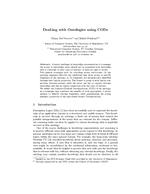DeaLing with Ontologies using CODs
From International Center for Computational Logic
DeaLing with Ontologies using CODs
Chiara Del VescovoChiara Del Vescovo, Rafael PeñalozaRafael Peñaloza
Chiara Del Vescovo, Rafael Peñaloza
DeaLing with Ontologies using CODs
In Meghyn Bienvenu and Magdalena Ortiz and Riccardo Rosati and Mantas Simkus, eds., Proceedings of the 27th International Workshop on Description Logics (DL'14), volume 1193 of CEUR Workshop Proceedings, 157-168, 2014
DeaLing with Ontologies using CODs
In Meghyn Bienvenu and Magdalena Ortiz and Riccardo Rosati and Mantas Simkus, eds., Proceedings of the 27th International Workshop on Description Logics (DL'14), volume 1193 of CEUR Workshop Proceedings, 157-168, 2014
- KurzfassungAbstract
A major challenge in knowledge representation is to manage the access to knowledge: users should not be presented with knowledge that is irrelevant to their topic of interest, or have no right to access.Two general strategies exist for providing access restrictions: (1) the ontology engineers describe the conditions that allow access to specific fragments of the ontology, or (2) fragments are automatically identified through their logical properties. The former is prone to miss logical connections between axioms, while the latter can fail to capture relevant knowledge that has no logical connection with the topic of interest.
We define the Context-Oriented Decomposition (COD) of an ontology as a technique that combines the benefits of both approaches: it allows authors to identify relevant fragments, while guaranteeing the strong semantic properties of the logic-based Atomic Decomposition. - Forschungsgruppe:Research Group: AutomatentheorieAutomata Theory
@inproceedings{ DVPe-DL14,
address = {Vienna, Austria},
author = {Chiara {Del Vescovo} and Rafael {Pe{\~n}aloza}},
booktitle = {Proceedings of the 27th International Workshop on Description Logics ({DL'14})},
editor = {Meghyn {Bienvenu} and Magdalena {Ortiz} and Riccardo {Rosati} and Mantas {Simkus}},
pages = {157--168},
series = {CEUR Workshop Proceedings},
title = {DeaLing with Ontologies using CODs},
volume = {1193},
year = {2014},
}
